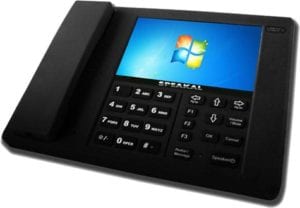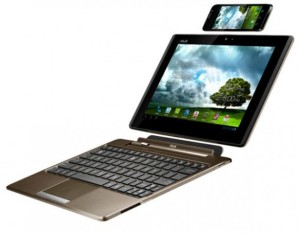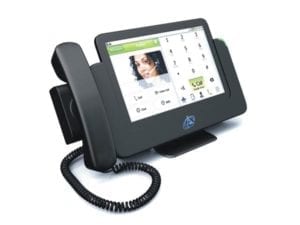Right now we’re starting to see a lot of convergence between mobile devices and desktop telephony equipment. Modern VoIP handsets are starting to stock up on functionality and applications that has, so far, been the sole domain of smartphones. This is true for touchscreens and app-compatible operating systems.
Convergence in Unified Communications
When you take the smartphone dynamics to desktop phones, you will notice an interesting trend.
 Microsoft’s next Windows operating system is going to interact seamlessly with Microsoft’s next generation of mobile OS. In fact, Windows 8’s mobile and desktop/laptop operating systems are doing more than merely “converging”. They will operate closer than just “seamlessly”. Windows for your computer is becoming the exact same OS as Windows for your next smartphone.
Microsoft’s next Windows operating system is going to interact seamlessly with Microsoft’s next generation of mobile OS. In fact, Windows 8’s mobile and desktop/laptop operating systems are doing more than merely “converging”. They will operate closer than just “seamlessly”. Windows for your computer is becoming the exact same OS as Windows for your next smartphone.
Provided, of course, you use a Windows phone for Unified Communications, which very, very, very few people do. But the relatively low popularity of Windows mobile devices needs to be taken alongside the continued popularity of Microsoft operating systems. Especially among the government and enterprise sets of users. Will the next generation of VoIP handsets run Windows 8?
Even if Microsoft went bankrupt next year the company’s decision to utilize the same operating system among desktop and mobile devices is highly telling about their vision of the future of communications technology. They envision the movement towards mobile competition including Apple and Google (owner of the popular Android mobile platform). Over the last year Apple has been steadily aligning their mobile and desktop operating systems by streamlining their desktop environment. Recently they began to establish uniform naming practices across for applications across their devices. Google, meanwhile, has been getting their feet wet in the world of desktop computers, ostensibly in response to the wild success of the company’s mobile efforts. There are presently several SIP handsets that run on Google’s Android.
While it seems highly unlikely that Apple will venture into the enterprise VoIP space in the immediate future, a thought of an appliance that converts your iPad into a desk phone is not far-fetched. After all – there are numerous appliances that try to do this to an iPhone. The trouble with that approach is that an iPhone is actually a less suitable candidate than an iPAD
A Need for Single-Role Devices
It’s easy for most people to see that desktop computers, laptops and mobile devices are rapidly converging. All are going to use the same applications and the same user interfaces in the future. Most users have an easy, intuitive and practical understanding of what computers have to offer that mobile devices can’t currently match. Even if they both use the same files and applications. For example, most of us understand that desktops are much better for typing and for using for extended periods of time for “real work” than mobile devices.
By contrast, people don’t have the same intuitive understanding of what value desktop handsets offer over smartphones. Most modern VoIP handset devices offer plenty of benefits, including the intuitive usage required for telephone users. Such convenience can only be provided by a single device locked into a single location devoted primarily to a single task. This is a form of functionality that no smartphone will quite match.
One U.C. Ecosystem, Multiple Single-Role Devices
From all of this mobile/desktop convergence in the world of computers we can extrapolate a principle for the future of communication technology. Uniform functionality and usability across the board regardless of what sort of device you’re using: a standard Unified Communications ecosystem. As far as computers are concerned mobile and desktop are going to work in pretty much the same way in the near future. This hints that we’re going to see something very similar occurring in the world of desktop phones.